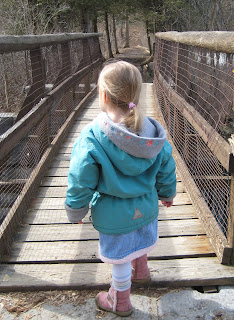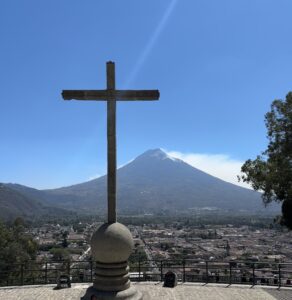by Mary | Mar 23, 2009 | Lent, prayer
Sorry I’ve been away for a few days. We had a virus at our house that just wouldn’t leave. I think we finally kicked it this weekend. So, I’m back, feeling better than I have in days physically but somewhat depleted and deflated spiritually. I had really been going strong with my Lenten spiritual reading and, in some ways, I was feeling the effects. There was a sense of underlying peace even as I went about my crazy days. Then the virus hit — first Olivia, then Chiara, then Noah, then me, then Noah a second time. Only Dennis escaped unscathed. Although I carried my spiritual reading and prayer book around the house with me, I just couldn’t focus on anything. And with each passing day I felt myself slipping backward a bit. Even my little Lenten sacrifices seemed more difficult, less meaningful the farther I got from my prayer life. I made a misstep here and a misstep there until I finally stopped and realized that the prayer and reading really had been making a difference.
So today I came crawling back to God, groveling and asking for help to get back on track. I hung my head, spiritually speaking, and decided to start at square one. I picked up The Little Black Book that is one of my Lenten guides. Today’s reflection was about having “shamelessness” in our prayer, being willing to go back to God again and again and again, like a pesky child begging a parent for something.
Jesus tells us to be persistent. Speaking of a man who goes to his friend at midnight asking for bread, he says, “I tell you, if he does not get up to give the visitor the loaves because of their friendship, he will get up to give him whatever he needs because of his persistence.” (Luke 7-8)
The Little Black Book asks: “What does this mean?…Does God need to be cajoled into doing what we want?” No, God does not answer our prayers because we are skillful at asking, it says. He answers our prayers because we are “shameless in asking.”
My spirit was buoyed. Maybe there was a method to my madness. It’s rare that shameless persistence is such a positive thing, so I’m going to run with this one — straight to God.
by Mary | Mar 19, 2009 | Life Lines
My latest Life Lines column:
I was sitting at the kitchen table this morning, when my 3-year-old decided to strike up a conversation about God and death. It’s not the first time she’s delved into the philosophical realm, so it didn’t come as a complete surprise. But even with the previous warning and the experience of writing a book about helping children deal with grief, I still consider it a challenge to talk to my son and daughters about dying.
After a series of classic preschool questions tinged with a touch of mysticism…Continue reading.
by Mary | Mar 16, 2009 | Uncategorized

Chiara and I took advantage of this spring-like day by hiking around Beaver Pond at Five Rivers Environmental Center across town from us. Despite a flooded trail that prevented us from looping the entire lake and mud up to our ankles, we had a great time, watching the geese and listening to the waterfall. We stopped in the center to visit Aries, the one-winged owl who makes his home there, and then picnicked out on the grounds. It was a little cool for a winter picnic, but Chiara loved it. Spring is definitely in the air.

by Mary | Mar 13, 2009 | spirituality

I was looking out my kitchen window today, when I spotted the one thing that is sure to bring a smile to my face at this time of year — a hardy little snowdrop with bright green leaves and delicate white flowers standing out against the dreary brown earth of winter. This one little snowdrop that you see in the photo above is always the first thing to come back to life each year in our yard. I know that other signs of spring will follow in fairly rapid succession, each one bringing us one step closer to the promise of lush green that will eventually surround us.
Just last week I was talking to some Sisters of Saint Joseph about the importance of taking time for spiritual retreats. And one of the sisters compared the growth experienced on a retreat to what I’m witnessing in my yard right now. In the dark, underground, where no one else can see, growth occurs. Roots grow deeper, life gets stronger, and suddenly there is s flower where there was once nothing. So it is with our spiritual journey. In the deep and dark recesses of our hearts, growth happens hidden from sight. We may look at ourselves and see the same old same old, and then one day something changes, something blossoms, and we realize that we were sending out spiritual roots in the quiet stillness, waiting for the moment when our true self could emerge for all the world to see.
Snowdrops were one of my favorite discoveries when we moved to upstate New York. And although I love the flowers that are to come, these little white signs of determination and hope are special to me. Imagine what I’ll be like by the time the bleeding heart and lilacs leaf out.
by Mary | Mar 12, 2009 | book review
So many times, as I was reading Left to Tell: Discovering God Amidst the Rwandan Holocaust, by Immaculée Ilibagiza with Steve Erwin, I had to remind myself that the book was not fiction, that it was all horribly, unbelievably true. Although I just happened to pick the book up because I’d seen a few mentions of it in various places, it turned out to be the perfect book to read during Lent. It is a story of incredible suffering and unshakable faith and unimaginable forgiveness — which is precisely what we’re supposed to be reflecting on during these forty days.
Left to Tell is the story of Immaculée’s miraculous survival while hiding in a tiny bathroom for 91 days with seven other Tutsi women while Hutu killers called her name just outside the bathroom door as they searched and searched for her for only one reason: to kill her. And not to kill her quickly, but to torture her and make her die the same kind of unspeakable death that almost her entire family and ONE MILLION Tutsis did during the 1994 genocide in Rwanda.
You need to read this book. Today. Now. Everyone needs to read this book because we need to remember what human beings are capable of when they choose evil over love, easy lies over hard truths. As I read Immaculée’s heart-rending story, I heard echoes of the mob shouting, “Crucify him,” 2,000 years ago. I saw flashes of images of Jews packed on trains headed to certain death at the hands of the Nazis. And I wondered, how do we allow this kind of senseless, shameful, systematic bruality to happen again and again throughout history? Where were the voices of reason? Where were we? On Good Friday, as we reflect on the Passion of our Lord, we cannot hide from the fact that we play a role in human suffering every time we remain silent in the face of injustice. Similarly, when you read Left to Tell, you will likely think back to where you were in 1994, where our country was in 1994, when the Tutsis were being exterminated, and grieve for a world that would allow this to go on unchecked and in plain sight.
This book, however, is not just a chronicle of death and suffering; it is the story of one woman’s ability to trust in God even when she had no obvious reason. Each night, when I put this book down before going to sleep, I would close my eyes and see Immaculée in that cramped bathroom — hungry, afraid, silent but always faithful. Her willingness to stare into the face of the man who killed her family and hunted her down and offer him forgiveness is a lesson in complete and total surrender to God. It is awesome and humbling and a stark reminder of just how radical the Gospel of Jesus is when we don’t try to water it down or soften it up.
I honestly cannot say enough good things about this book. Please read it. And please visit Immaculée’s website by clicking HERE.



